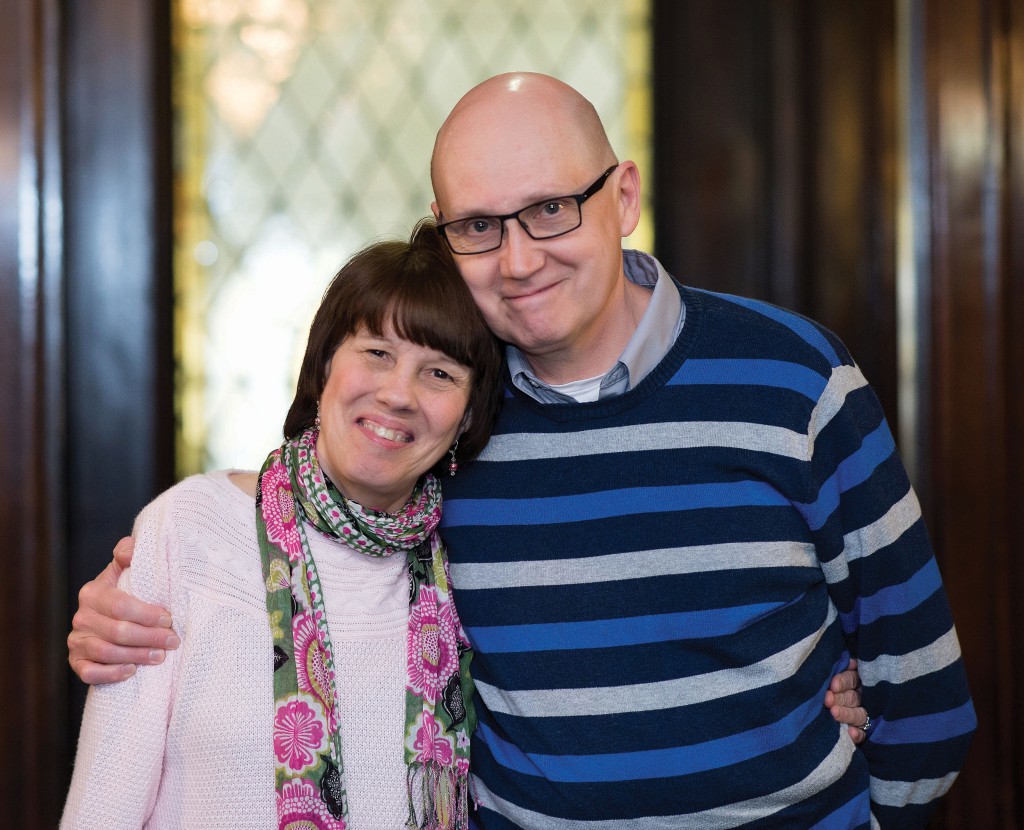You have free articles remaining this month.
Subscribe to the RP Witness for full access to new articles and the complete archives.
When looking for a pastor, one does not just stop by a favorite big box or do-it-yourself store. One could spend countless, fruitless hours wandering the aisles looking for the non-existent “pastor section.”
In the Reformed Presbyterian Church of North America (RPCNA), the Lord has seen fit to train pastors under the direct oversight of professors who, first and foremost, are pastors. Since the early 1800s, this denomination’s pastoral students have walked alongside men who taught the lessons of the classroom while living them out in congregational life.
The world has changed significantly since 1810, when Reformed Presbyterian Theological Seminary (RPTS), the fourth oldest seminary in the United States, was formally organized. In the time since, the teaching and mentoring philosophy has changed little. Students still study systematic theology, Greek, Hebrew, church history, and the Old and New Testament, along with courses in homiletics, counseling, discipleship, missions, and more, learning from men who are integrating theological knowledge with real life.
In Pittsburgh
Programs of Study
Students have also changed throughout the last couple hundred years. Rather than coming from the RPCNA alone, today’s students are a global collection of men and women representing a variety of denominations and independent churches. The traditional course of study, the Master of Divinity (MDiv) degree, is still the foundation of training at RPTS. The seminary faithfully trains men for the pastorate via this program, sending workers throughout the world. Beyond the MDiv, the Doctor of Ministry (DMin) degree is designed to bolster the spiritual lives of seasoned pastors seeking further academic and practical enhancements to their ministry.
Also offered is a Master of Theological Studies (MTS) degree, which prepares men and women for general ministry, biblical counseling, or teaching. My wife, Sharon, and I have benefited from our studies in the MTS program. An emphasis in biblical counseling has been a tremendous blessing in my ministry as an elder at North Hills (Pittsburgh, Pa.) RPC, and together Sharon and I work with people seeking the Lord’s answers to the challenges of life. We would both say that we have become better Sabbath school teachers and that our personal spiritual journeys have been blessed through our studies.
Intensive Courses
Sometimes a great deal of benefit can be had in a short amount of time. Some of the options available at RPTS are intensive courses. By working longer days, class material typically covered in one quarter is covered in a one-week timespan. Offered at the end of the spring and summer quarters, intensives enable students to maximize learning with minimum disruption to work and family schedules. Often, distance students will take vacation time from work and travel to Pittsburgh, as intensive courses are usually very hands-on and require a significant amount of cooperative work and interaction. Intensive classes include Dynamics of Public Speaking, Theology and Method of Missions, Church Planting, and Vital Churches. Dynamics of Public Speaking and Theology and Method of Missions will be offered in May 2019. Vital Churches will be offered in Aug. 2019. The Church Planting course is next planned for 2020.
Dynamics of Public Speaking
Taught by Dr. Calvin Troup, president of Geneva College, Dynamics of Public Speaking introduces the theory, principles, and practices involved in public speaking. As a performance course there is a heavy emphasis on presenting and analyzing your own speeches. If you do any public speaking, this course is for you. Even seasoned pastors have found this course to be a blessed refreshment. Ruling Elder Chris Villi, a graduate of RPTS who is on the session at Grace RPC in Gibsonia, Pa., is contemplating auditing Dynamics of Public Speaking to help provide some speaking discipline in his use of outlines and manuscripts when he teaches and preaches. Several active pastors in the RPCNA have benefited from Dr. Troup’s encouraging class, bringing new insight into their preaching ministry.
Theology and Method of Missions
Theology and Method of Missions is taught by Professor Vince Ward (recently of South Sudan) and another veteran RP foreign mission worker. Participants will gain a better understanding of God’s concern for the nations woven throughout the Scriptures and of the challenges of cross-cultural communication for evangelism, church planting, and Bible translation. Current trends in mission practices will also be evaluated. Anyone interested in missions (short or long-term) will find this course to be incredibly helpful.
Church Planting
Church Planting, which is offered every other year and next in 2020, is led by President Barry York, an experienced church planter. Dr. York brings in others from the denomination to assist with this important topic. This class is designed to lay the crucial foundations necessary to plant a church and has in mind those preparing to do so, those already involved in a new work, or those wanting to support such work. The coursework is highly interactive, helping students develop an in-depth church planting plan. Further time is spent familiarizing students with the work and writings of those being used of God in planting. The forming of partnerships, networks, and alliances for church planting are explored as well.
Vital Churches
Whether a congregation is going through a season of struggle or strength, every church leader needs to be knowledgeable of, and infusing into the congregations they serve, principles of church vitality. The Vital Churches course will encourage students, in a workshop format, to grow in and apply such principles as unconditional dependence upon the Holy Spirit through practicing prayer, clarifying the understanding of the role of ordained leadership, putting into clear focus the church’s mission, and defining carefully the plan to seek to fulfill the mission of the church. Students in this course will become familiar with the work and writings of those church leaders who, being led by God, are undertaking this important aspect of congregational ministry.
Dr. York guides participants through many topics, including the identification of mentors the Lord has placed in your life, growing in your awareness of how God is shaping you for leadership, learning how to live in such a way that people will follow you as you follow Christ, and becoming utterly convinced of the need of prayer in church leadership. The Vital Churches Committee of the RPCNA is a strong partner in this program that is uniquely designed to assist active pastors as well as students. This course is planned for late summer 2019 at the seminary, Lord willing.
Auditing
Not all students study for credit or degrees. Some folks simply enjoy the Word of the Lord and wish to learn and love it more deeply through seminary-level training. Auditors are part of a growing segment of the seminary community. They participate in classes without the requirement to submit papers or take examinations. For these students, reading the applicable texts, though helpful, is not required. David and Lynne Dunlop, a retired couple in the Pittsburgh area, have audited classes since 2014. They have worked their way through most of the courses taught by Dr. C.J. Williams and are currently working through New Testament and archeology classes with Dr. Jonathan Watt. One can also audit from a distance using the online classes.
Distance Education
Obviously, not everyone can set aside their lives and responsibilities to move to Pittsburgh, though Pittsburgh is a wonderful place (full disclosure: it is a bit cloudy, so we do not see the sun very often). Starting back in 2012, the Seminary Board of Trustees authorized the launching of a distance education program. More than 95% of the courses are available digitally. The small percentage of courses not available online involve high levels of interaction or field work. It is difficult, for example, to do evangelism in pajamas in front of your computer in your basement. You must go into the public and talk with people. There is also great value in being in community with students learning together and learning about each other.
The seminary experimented with live streaming but found several challenges. While RPTS has state-of-the-art equipment, many students do not, and their experience suffered as a result. Additionally, part of the attraction of online learning is the flexibility in timing. Streaming requires coordination of schedules, which is challenging when the students live in different time zones or countries.
Pathwright
Resources are available for remote students seeking theological training who wish to benefit from the same coursework that seminarians enjoy. Several of the seminary’s courses are available at Pathwright, an online education resource. RPTS has placed biblical counseling courses along with an Introduction to Reformed Theology and a Mercy Ministry class within this system. Courses are available for a fraction of the normal cost of attendance and have the flexibility of matching with the student’s personal schedule. Do you want to study biblical counseling at two in the morning? You can do that. Do the deacons of the church wish to learn more about mercy ministry? They can gather together and do that, gaining seminary experience in the convenience of their home communities.
These courses are designed with incredible flexibility for those who are not interested in formal degrees or certificates but simply desire to bask in God’s Word via seminary-level training. Once the course is purchased, full access is given to video lectures along with course notes and outlines. Tri-Lakes RPC of Monument, Colo., purchased the Deacons and Mercy Ministry course. The deacons have been studying together and independently, benefiting from Dr. York’s targeted training on serving the church and community through the ministry of mercy. Some churches, like the Stillwater, Okla., RPC utilize courses housed at Pathwright for Bible studies or Sabbath school classes. Materials are divided into smaller segments that can be used in a small group format. Some courses have full study guides as well. Lord willing, the seminary will continue to add offerings to the glory of the Lord and the encouragement of the saints. The full library of courses can be found at rpts.pathwright.com.
Fruit of the Digital Age
The digital age, in many ways, has created another era of global evangelism and encouragement. One of the seminary’s students is Sylvester Konteh, a student under the care of the Reformed Presbyterian Church of Scotland. Sylvester lives and studies in Gambia, utilizing RPTS’s online programming. “Dr. York’s lectures on mercy have reminded and motivated our church to minister to the widows through a meal program after worship,” notes Mr. Konteh. “We see people coming to church and hearing the gospel, as we have time to talk with them during the meal. We are praying for more ways to help the poor and share the gospel.”
Summary
Never in the history of the world has so much theological information been available to so many people. The seminary builds upon that information base with the wisdom of experienced pastors and mentors who help students know how to properly use His Word. The internet and the classroom have brought together a unique group of students who share a passion for the lost and a desire to encourage the church. There is a great harvest, and there are many ways to prepare those who will proclaim the truth in the fields of the Lord.
Mark Sampson | chief administrative officer and director of institutional advancement at the Reformed Presbyterian Theological Seminary in Pittsburgh, Pa.

